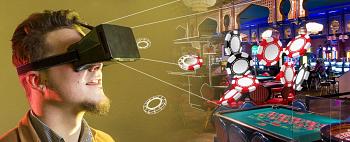VR Technology To Boost Online Casino Gaming Growth
Virtual Reality (VR) possesses a technology that can transform the whole world and not just the online gambling scene—with VR leaders like Mark Zuckerberg, CEO of Facebook, announcing an ambitious goal to make virtual reality accessible to billions of people.
“We are setting a goal,” said Zuckerberg at his company’s Oculus Connect event at the San Jose Convention Center last year.“We want to get a billion people in virtual reality,”
According to a new survey, advancement in technology, consumer expectations and industry innovations will be among the main drivers behind a huge rise in virtual reality gambling over the next four years.
Analyst firm Technavio, released the Global VR Gambling Market 2018-2022 report, which predicts that the VR gambling market will witness a compound annual growth rate of close to 55 per cent by 2022, while incremental growth will be $360m (€308m) between 2017 and 2022.
According to Technavio, while some casino operators have already started embracing VR gambling services, gamers remain “uncertain” and “are yet to adopt [VR gambling] on a wide scale.”
However, the current development is expected to change over the next few years. With more players discovering how to play the most common casino games online, operators in the industry would continually embrace new technology to improve player’s gaming experience. The implementation of VR would not only be important for online casino companies, but also land-based casinos.
“With the addition of gamification in programmes for games, both brick-and-mortar and online casinos are trying to make conventional formats for gambling more appealing to millennials,” said a Technavio spokesperson in a report.
“Casinos are adopting VR technology, in which players can compete with each other for cash prizes in spirited VR tournaments. One such example is the introduction of ‘Virtual Zone’ by Boyd Gaming, in partnership with HTC and IGT.”
The report also suggested that mature gambling markets such as the UK will lead the way in fully adopting the technology, referencing SlotsMillion’s launch of the country’s first 3D VR casino in 2015, after owner ALEA was issued a license. Technavio added that technological uptake could affect other markets, causing them to prove vital, with “rapid pace” expected in China—being the largest consumer base for VR headsets worldwide.
Interestingly, Technavio claimed that in compiling its report, it found evidence that VR technology can utilized in curing gambling addiction.
“There are cases where therapists are authorised to provide gambling addicts with a VR environment, catering to the latter’s needs,” said a Technavio spokesperson.
In a 2016 study on gambling addition in Canada, the results showed that risk and problem gambling impacted families and relationships in a wave-like manner, disrupting the regular functioning of families and relationships at periodic intervals.
Also, more than 2 million people in the UK are either problem gamblers or at risk of addiction, according to the Gambling Commission, which warned that the government and gambling industry were not doing enough to tackle the problem.
“We have a clear commitment to make gambling fairer and safer and these figures show that this is a significant challenge,” said Tim Miller, executive director of the Gambling Commission. “Success will depend upon us, the industry, government and others, all working together with a shared purpose to protect consumers.
“The pace of change to date simply hasn’t been fast enough – more needs to be done to address problem gambling.”
Comments
There are 0 comments on this post













